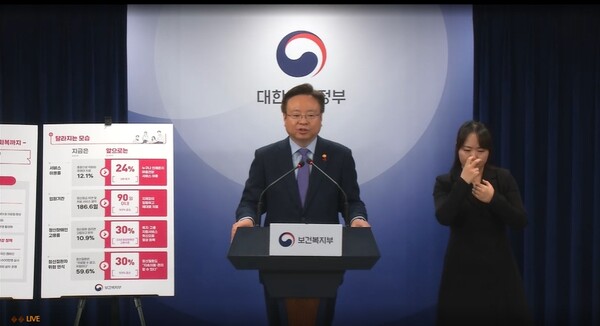
The government on Tuesday unveiled plans to implement an innovative mental health policy, encompassing four key measures. This comprehensive approach aims to provide support for individuals at risk of or experiencing mental illness, covering prevention, early treatment, recovery, and facilitating a return to daily life.
To proactively prevent mental illness and offer early treatment, counseling services will be extended to one million individuals facing emotional and psychological difficulties. Simultaneously, there will be enhancements to the infrastructure for swift treatment and ongoing management of severe mental conditions. The plan also includes improvements to the number of related treatments, and the establishment of the Presidential Committee on Mental Health Policy and Innovation.
President Yoon Suk Yeol chaired the Mental Health Policy Vision Declaration Conference on Tuesday afternoon at the Blue House Yeongbin Hall, where the government presented the details of the "Mental Health Policy Innovation Plan."
To bring the nation's high suicide rate down to the average level of the Organization for Economic Cooperation and Development (OECD) within the next decade, the government has outlined four key tasks: 1) establishing a daily mind care system, 2) reorganizing mental emergency response and treatment systems, 3) innovating welfare services for full recovery, and 4) improving awareness and establishing a mental health policy promotion system.

1) Establishing a daily mind care system
The Ministry of Health and Welfare aims to proactively prevent and address mental illness by initiating psychological counseling for medium- and high-risk groups facing emotional and psychological difficulties. The counseling initiative will commence with 80,000 individuals in 2024, expand to 500,000 by 2027, and gradually reach 1 million by the end of Yoon’s term.
The government is set to augment the number of counselors from 80 to 100 to conduct awareness training for suicide prevention, with a focus on improving the response rate to emergency counseling calls. Additionally, there are plans to introduce social media counseling, including text messages and messenger services, specifically catering to teens and young adults who prefer text-based conversations over phone calls.
Specifically, mental health screening for young adults will be broadened to cover not only depression but also schizophrenia and bipolar disorder. The screening cycle will be condensed from 10 years to two years. The government is set to implement 19 types of self-diagnosis services for depression, anxiety, and bipolar disorder through the National Mental Health Information Portal, accessible on mobile devices.
2) Strengthening psychiatric emergency response
Emergency hospitalization response to mental illness will be also enhanced. Regional psychiatric emergency medical centers catering to traumatized and mentally ill patients will be extended nationwide by 2025, ensuring the availability of psychiatric emergency beds. Joint response centers for mental health professionals and police officers will be instituted in 17 cities and provinces across the country, providing round-the-clock assistance for mental emergencies. The number of responders is slated to increase from 204 to 306 by the next year.
To enhance the quality of care for mental illnesses, starting from January next year, intensive care and isolation fees for closed wards will be increased to 47,030 won and 118,260 won, respectively. Furthermore, there will be improvements in the reimbursement standards for occupational and recreational therapy.
The government will initiate a public discussion on the implementation of a judicial hospitalization system for mentally ill patients. Additionally, the "Outpatient Treatment Support System" will be activated to assist patients at risk of self-harm, aiming to prevent them from discontinuing their treatment.
Specifically, the government intends to create procedures and systems to enable the treatment of discharged patients exhibiting self-harming behaviors without their consent, if deemed necessary. This will be facilitated through information linkage between medical institutions and mental health welfare centers.
3) Innovating welfare services for full recovery
A welfare system will be implemented to support the daily recovery of individuals with severe mental illness. There are plans to enhance admission procedures and staffing standards for psychiatric care facilities. Additionally, a long-term plan will be developed to reorganize these facilities into rehabilitation centers. Furthermore, efforts will be made to conduct surveys and, if necessary, relocate all residents to suitable facilities as part of a comprehensive plan.
To foster economic independence among the mentally ill, employment support will be extended, coupled with housing assistance to promote social independence. Additionally, research will be conducted to develop insurance products tailored for the mentally ill, aiming to eliminate discriminatory practices.
Furthermore, the government will explore the possibility of introducing Psychiatric Advance Directives (PAD) and broaden the scope of public guardianship from psychiatric facility residents to community residents. This expansion will allow patients to designate decision-making agents, preferred treatment organizations, and physicians in advance, especially in a mental emergency.
4) Promoting awareness campaigns to eliminate stigma
Alongside proactive awareness campaigns to eradicate mental health prejudice, the government aims to establish and operate the Presidential Committee on Mental Health Policy Innovation. This committee will focus on creating a policy promotion system and formulating detailed measures, including support for the employment and housing of the mentally ill, implementing an emergency transportation system, and outlining a roadmap for social rehabilitation.
Additionally, measures will be developed to enhance the training and treatment of mental health professionals. The goal is to incrementally increase the number of mental health professionals from the current 194,000 to 228,000 by 2027, marking an expansion of 34,000 professionals.
Furthermore, the government intends to reduce the number of mentally ill individuals per case manager from the current 25 to 22. Additionally, there are plans to enhance the treatment of mental health welfare center employees by gradually increasing salaries, and ensuring the long-term employment of specialized mental health professionals.
"By making bold investments in national mental health, we will create a society where all citizens can access mental health services anytime, anywhere, and the mentally ill can be properly treated and live together," said Cho Kyoo-hong, Minister of Health and Welfare.

